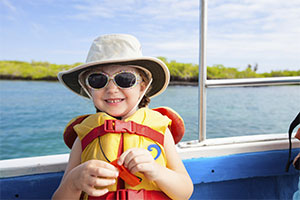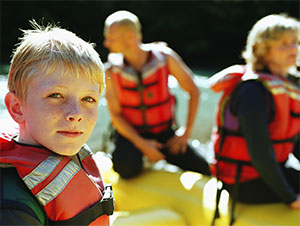 When it's hot, the cold water calls. If you're lucky enough to have access to a lake, river, or community pool, it's vital to know basic water safety in order to prevent serious consequences. Approximately 10 people die each day from unintentional drowning, and according to the Center for Disease Control, drowning is the leading cause of injury death for young children, ages 1-4.
When it's hot, the cold water calls. If you're lucky enough to have access to a lake, river, or community pool, it's vital to know basic water safety in order to prevent serious consequences. Approximately 10 people die each day from unintentional drowning, and according to the Center for Disease Control, drowning is the leading cause of injury death for young children, ages 1-4.
Our top ten suggestions to keep you and your family safe in the water.
- Stick together: No matter how old you are, it's not a good idea to go swimming solo. Take a friend so that somebody is available to help in the event of an accident.
- Always supervise: Young children should always be watched closely by an adult (not another child) when playing in or around water.
- Get smart: It's a good idea for water recreationalists of all ages to take basic water safety and swimming lessons, if necessary. Being comfortable in the water and knowing what to do in an emergency situation goes a long way in preventing accidents in the water.
- Stay sober: Drinking alcohol greatly increases your chance of drowning or having an accident in the water. If you have been drinking, stay out of the water and do not use rafts, canoes, or other floatation devices. Never drive a boat if you are intoxicated.
- Use safety equipment: People of all ages should always wear life- jackets when boating; like seat belts, they greatly decrease the risk of drowning in the event of an accident or unpredictable water.
- Don't get shocked: Outdated wiring, underwater lighting systems, and electronics like radios and TVs can all cause electrocution if they come into contact with water. If a swimmer is shocked and somebody jumps in the water to help, they may be electrocuted as well. Pool and hot tub owners should have their facilities and equipment inspected and updated if necessary.
 Learn CPR: Those working with or supervising children especially should learn how to perform CPR and renew their training regularly. You never know when this lifesaving procedure might come in handy, and if it does, you'll sure be glad you know how to do it.
Learn CPR: Those working with or supervising children especially should learn how to perform CPR and renew their training regularly. You never know when this lifesaving procedure might come in handy, and if it does, you'll sure be glad you know how to do it. - Stay clean: Germs or chemicals in pools and hot tubs can cause illness and adverse reactions. Teach kids not to swallow any water and enforce regular bathroom breaks during pool time. Make it a habit to rinse off in the shower before getting into the pool. Don't allow sick kids to play in the water. Check PH and free chlorine levels twice a day and keep pools and hot tubs clean and well maintained. Inflatable and plastic pools should be drained and cleaned often to prevent recreational water illnesses.
- Protect skin: Apply waterproof sunscreen with an SPF of 15 or more at least 30 minutes before going outside, and reapply several times throughout the day.
- Pay attention to your body: Experiencing dehydration, exhaustion, or hunger while swimming or playing in the water can be dangerous, especially when it's hot outside. Take regular breaks from the water, stay well hydrated, and make sure to eat meals and snacks to keep your energy up.
For answers to any of your insurance questions, call or contact Litaker Insurance today.
